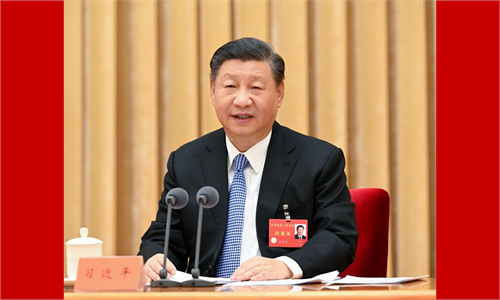ARTS / BOOKS
Renowned Chinese translator Wang Zhiliang passes away at 94, leaves behind incomparable legacy for China-Russia literature exchange
Wang Zhiliang was on a TV programme Photo: Screenshot from Beijing Daily website
Revered Chinese translator Wang Zhiliang passed away in Shanghai on Monday night at the age of 94, according to a report from the Beijing Daily.
The renowned translator was awarded the Translation Culture Lifetime Achievement Award by the Translators Association of China for his contributions to the translation of Russian literature into Chinese during his almost five-decade long career, including 30 novels such as the well-known Eugene Onegin, The Captain's Daughter and Anna Karenina.
Even now, the Chinese versions of the classic works of Leo Tolstoy, Fyodor Dostoevsky, Nikolai Gogol and many other highly respected writers are still some of the bestsellers in many Chinese bookstores, Zheng Tiwu, the dean of the Institute of Literary Studies at Shanghai International Studies University, told the Global Times on Tuesday.
"Literary exchanges between China and Russia have a history of more than 150 years," Zheng said, adding that after the founding of the People's Republic of China in 1949, classical Russian literature and Soviet literature once became the mainstream for foreign literature in China, which can be described as "one particularly thriving branch of the tree" that outshines other foreign literature.
He also pointed out that thanks to the convenience of the internet, people-to-people exchanges in the literary world between the two countries are becoming more frequent.
"You can find cultural scholars in China and Russia have translated each other's works and published them on their personal webpages."
Zheng explained that the biannual China-Russian Young Writers Forum, launched by the Institute of Literary Studies at Shanghai International Studies University in China and the Union of Soviet Writers in Russia, has become a good platform for young writers from the two countries to understand contemporary literature and the thinking of writers.
"We need to present more exchange opportunities to younger generations in both countries as they are our future."
Chinese literature is also an important medium for Russian people to understand China. Many reputed universities in Russia, including Moscow State University, St. Petersburg University and Far Eastern Federal University, have set up Confucius Institutes to translate and study Chinese writers' works, Zhang Hongbo, director-general of the China Written Works Copyright Society, told the Global Times on Tuesday.
Wang Zhiliang's draft translation of Russian novel Eugene Onegin
According to a report released by the National Press and Publication Administration, China exported the copyrights to 947 and 882 books to Russia in 2019 and 2020 respectively, making Russia the top destination for Chinese book copyrights for two consecutive years. (Official statistics for 2021 have not yet been released.)
Zhang added that China's traditional literature works, such as those from the school of Confucianism, have had a profound influence on Russia. In addition, literary and artistic works that reflect the economic and social development of contemporary China as well as science fiction works represented by Chinese writer Liu Cixin are very popular among Russian readers.
Chinese contemporary dramas are another hit topic. The association is helping Russian sinologists select contemporary Chinese drama masterpieces. For example, Chinese Nobel Prize winner Mo Yan's literature Frog will debut on the stage of Russian dramas in 2023.




